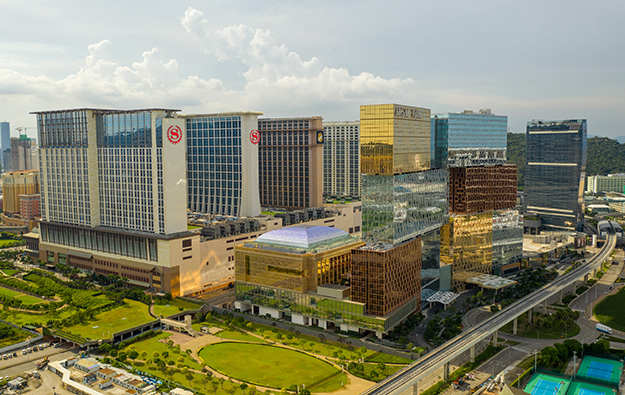Labour Day hols hotels to be 40-50pct full: Macau govt
Apr 16, 2021 Newsdesk Latest News, Macau, Top of the deck

Average nightly occupancy for Macau hotels, including properties in casino resorts (pictured), during the upcoming Labour Day holiday in May could be “40 percent to 50 percent”, based on bookings so far, indicated on Friday a Macau tourism official.
Hoi Io Meng, deputy director of the Macao Government Tourism Office (MGTO), cited the figures to the Chinese-language radio service of the city’s public broadcaster TDM.
China’s State Council has designated the first five days of May as the Labour Day break for this year. Currently, only mainland China has a usually quarantine-free travel bubble with Macau.
The tourism official said the city had seen an aggregate of “over 190,000″ visitors during the past week. If such levels could be sustained without any “major” further changes in the Covid-19 pandemic situation, it should bode well for the Labour Day break, said Mr Hoi.
As of Thursday, Macau ID holders have been able to register with any of the city’s 161 accredited travel agencies, to book a government-subsidised “staycation” at any of more than 70 hotels and guest houses, including most hotels within the city’s major casino resorts run by the local gaming concessionaires.
The scheme applies to all bookings by local ID holders for the period between April 23 and December 31 inclusive, and is part of an MGTO initiative called “Stay, Dine and See Macao”.
The initiative could help boost nightly occupancy at the city’s hotels, remarked Macau Hoteliers and Innkeepers Association president, Kenny Cheung Kin Chung, in an interview broadcast on Friday by TDM’s Chinese-language radio service.
Related articles
-
 Macau average 5-star 1H rate 96pct of...
Macau average 5-star 1H rate 96pct of...Jul 22, 2024
-
 Visitors, steady spend to support Macau...
Visitors, steady spend to support Macau...Jul 18, 2024
More news
-
 Donaco EBITDA up y-o-y to above US$4mln...
Donaco EBITDA up y-o-y to above US$4mln...Jul 26, 2024
-
 HK listed Palasino upgrades Czech...
HK listed Palasino upgrades Czech...Jul 26, 2024
Latest News
Jul 26, 2024
Border-casino operator Donaco International Ltd has achieved a 164.17-percent year-on-year increase in its latest quarterly group earnings before interest, taxation, depreciation and amortisation...Sign up to our FREE Newsletter
 (Click here for more)
(Click here for more)
Pick of the Day
”We’ve got more traction outside of Macau at the moment. But Macau’s going be a bigger focus for us”
David Punter
Regional representative at Konami Australia
Most Popular
 Sheraton brand to exit Londoner Macao, to be Londoner Grand July 25, 2024
Sheraton brand to exit Londoner Macao, to be Londoner Grand July 25, 2024  Macau regulator probes unlicensed gaming agents July 24, 2024
Macau regulator probes unlicensed gaming agents July 24, 2024  Philippines gives 20k aliens in POGOs 60 days to leave July 25, 2024
Philippines gives 20k aliens in POGOs 60 days to leave July 25, 2024  Philippines-listed DigiPlus says not affected by POGO ban July 24, 2024
Philippines-listed DigiPlus says not affected by POGO ban July 24, 2024  Sands China 2Q EBITDA down q-o-q amid low hold, renovation July 25, 2024
Sands China 2Q EBITDA down q-o-q amid low hold, renovation July 25, 2024






